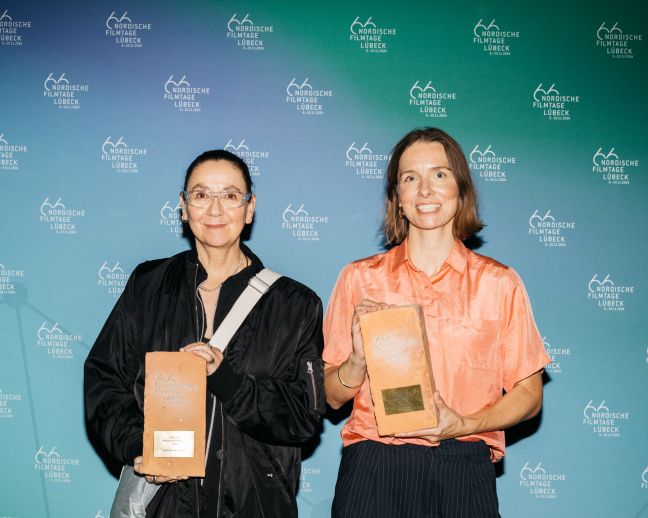Angelina Maccarone and Anne Döring receive the second Lübeck script grants
Angelina Maccarone and Anne Döring © Hanna Lenz

Lübeck, November 6, 2024. The Nordic Film Days Lübeck has announced the two recipients of the Lübeck Script Development Grant, awarded this year for the second time. The grantees were named during the opening celebrations for the 66th Nordic Film Days (November 6—10, 2024). The grant for a noted writer for a new theatrical film goes to Angelina Maccarone for her project “Back to Scharbeutz”. The second grant, to a writer with ties to Lübeck for an open format visual story for any platform, goes to Anne Döring for her documentary and exhibition project “Drei Farben Zeit”.
They were chosen from almost 90 candidates by a jury made up of Barbara Häbe, deputy head of theatrical and television films at broadcaster Arte, last year’s recipient Annika Pinske, and Anna Hoffmann, programme manager for the Forum section of the Berlin International Film Festival.
“Angelina Maccarone and Anne Döring made an impression on the jury with their projects. We congratulate both recipients and bid them a warm welcome to the 66th Nordic Film Days and to Lübeck”, said Susanne Kasimir, the NFL’s managing director. Artistic director Thomas Hailer added, “Now we look forward to the development of the material here in Lübeck, and the recipients exchange with Lübeck’s residents”. The head of the Lübeck Script Development Grant, Martin Rehbock, will mentor the two women over the course of the year.
Angelina Maccarone made her name with TV films such as “Kommt Mausi raus?”, “Alles wird gut” and “Babylon aka Ein Engel schlägt zurück”. Her first theatrical film “Unveiled” won the Hesse film prize in 2005. In 2006, “Verfolgt” (“Hounded”) won a Golden Leopard in Locarno. Her film “Vivere” also attracted international attention, winning the artistic achievement award at the Los Angeles Outfest, among other accolades. In 2011, Maccarone’s documentary “The Look” about actor Charlotte Rampling premiered at the film festival in Cannes and was nominated for the German film prize. Her script for the theatrical film “Klandestin” won a Lola in 2017 for best unproduced screenplay; the film finally premiered in July 2024 at the Munich film festival. Angelina Maccarone has been a professor of directing at the Babelsberg film university since October 2014.
Her project “Back to Scharbeutz” is a muted comedy that tells the story of 53-year-old Su, who left Scharbeutz and Lübeck immediately after high school and went to New York to make films. There, she makes cooking shows produced by her partner Leslie. The death of her father brings Su back to where she grew up, and she moves in with her mother Regina. The two begin to fight immediately. But when it turns out that her mother can no longer manage on her own, and Leslie breaks up with Su during a Zoom call, the erstwhile New Yorker decides to stay in Scharbeutz, at least for now … “The present meets the past with delicate humour and painful truthfulness”, said the jury, “laying bare the contradictions of our time. A film for the big screen.”
After working as an assistant stage director (including at Berlin’s Theater Hebbel and Kampnagel in Hamburg), Anne Döring studied media and literature at the university of Kiel. From 2015 to 2022, she was a research associate with the university’s philosophy department. She teaches (visual) writing at several colleges (including Hamburg’s University of Fine Arts). She has been working as a freelance writer, screenwriter, and dramatic advisory since 2018. Döring screened her 2020 short “Infloresence” at the 70th Berlinale. Her film “First Time” received an honourable mention in Locarno and won the German short film prize.
“Drei Farben Zeit” takes on the issue of cross-generational German war trauma since 1945, using the memories and objects of three generations of Lübeck women. Herself a member of the grandchildren’s generation, she uses her own anxieties to merge personal stories, historical documents, and the commentary of trauma experts, to make new links visible and create topical references to flight, loss, and destruction. The project is a poetic visual form, exemplified by the Kaiserpanorama device, a precursor to film in which visitors watched a series of rotating stereoscopic images through lenses at individual viewing stations. The jury summed up by saying, “With an intelligent installation of visual and poetic profundity, the artist takes us on a journey to the past destined to make us curious.”
The grants, of € 35,000 each, are funded by the Possehl Foundation for an initial period of three years. In addition to the monetary grant, the foundation will also provide the recipients with individualised advice, including script consulting, as well as residency, research, and networking opportunities in Lübeck and at the Nordic Film Days festival. The grant recipients will be hosted by the Nordic Film Days Lübeck, in cooperation with the non-profits Kino Koki repertory cinema and the Waldzimmer cultural association, as well as the Lübeck municipal library. One special aspect of the Lübeck Script Development Grant is an open exchange with the city’s public. Anyone who is interested can attend workshop discussions, curated film series, and script readings, participating directly in the creative process. The recipients will also be actively networked with local filmmakers and players in the cultural scene.
We would like to thank our partners CineStar, STAWAG, Stadtwerke (public utilities) Lübeck, Moinsener, skanbo, Finnlines, Grundstücks-Gesellschaft TRAVE, Convotis, SG Medientechnik, avt plus Mediaservice, Europäisches Hansemuseum and our media Medienpartners, broadcaster NDR and the Lübecker Nachrichten newspaper.
Press contact:
Julia Kainz, PR Agentur filmcontact
E-Mail: presse@nordische-filmtage.de
Telefon: +49 (0) 163 2508578






